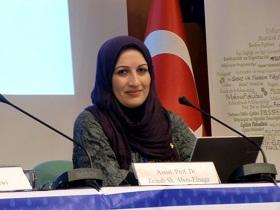The state of smart cities in MENA
11 December 2025
Published online 7 September 2011

In commemoration of the centenary of Marie Curie winning the Nobel Prize in Chemistry, the United Nations Educational, Scientific, and Cultural Organization (UNESCO) has launched the International Year of Chemistry 2011 initiative.
The initiative awarded ten female researchers the title of Women in Chemistry. Zeinab Abou-Elnaga, an Egyptian researcher at Mansoura University, Egypt, is the only Arab researcher to make the list.
Nature Middle East talked to Abou-Elnaga about her work, the challenges of being a female researcher, and her hopes for the future of science in Egypt.
I am an entomologist in the zoology department. I'm a lecturer, but my research combines zoology, botany and chemistry. I focus on using natural compounds to produce environmentally friendly insecticides that can be used to control harmful insects, and effective management of water resources.
I was nominated for the UNESCO award for my research, which was published in the journal Clean – Soil Air Water. It suggested that natural chemical compounds extracted from the seaweed Caulerpa racemosa could be used as an insecticide, especially against mosquitoes1.
Women in the Arab world have defined social roles and tasks, and society always gives priority to a woman's role in the family and fulfilling its needs over her career. Some of our male colleagues do not appreciate the fact we are working with them and see us as competition. Many people here in Egypt see that a woman should stay at home and take care of her children rather than going out to work.
I am trying to do my best to control my life, but I have double the normal workload as I'm not only a researcher, but a lecturer as well. There are times when I go on for a couple of days without really seeing or spending time with my nine-year-old daughter because I spend long hours in my lab. But I am very lucky— I have a wonderful girl. Sometimes when I return home after a long day in the lab and she has already gone to bed, I'd find she has left me a sticky note on my laptop reading: "Mum, I miss you and love you". That always lightens up my heart.
The biggest problem is our labs are ill equipped. They are just walls and benches with hardly any equipment. To actually conduct research I have to buy expensive chemicals and do expensive tests at my own expense. Some of these are not only costly, but I have to travel far away as they are only available in certain labs.
Sometimes the only way to get your work done is to have contacts in foreign universities and to ask them for assistance. That happened to me once when I discovered a new crystalline compound and tried to have it analyzed. I had to travel the two hours to Cairo from Mansoura where I live to use the only apparatus in the country that can do this analysis. When I arrived they told me it was broken and will not be fixed for six months. I could not wait that long so I contacted my colleague Nikolai Kuhnert at Jacob's University, Bremen, Germany, who was excited when I sent him a picture of the compound, and he sent to Germany to be analyzed at his own expense.
I am working on several other insecticides to control harmful insects that damage essential crops like wheat and rice, which are economically important and essential for the daily needs of Egyptians.
I am also working on mosquito control methods by using the environment against them. I'm trying to use certain water-based plants that can release natural compounds that kill mosquitoes.
I'm also involved in a project funded by the German Academic Exchange Service (DAAD) for water resources management in Egypt, where we are trying to remove pesticides found in farm drainage so we can recycle the water and reuse it for irrigation.
Of course, the revolution is a very important chance to encourage science and scientists. I am already using my contacts with foreign organizations to support education and scientific projects in Egypt. For example, DAAD contacted the deputy director of Mansoura University telling us that they will increase their funding to support education, research and democracy in Egypt.
I contacted the Braunschweig University of Technology in Germany and several projects are planned to promote technology and information transfer, such as students and teaching staff exchange. They will also provide our university with much needed equipment.
I am optimistic for the future and hope I can be a reason for the development of Egypt after the revolution.
doi:10.1038/nmiddleeast.2011.117
Stay connected: